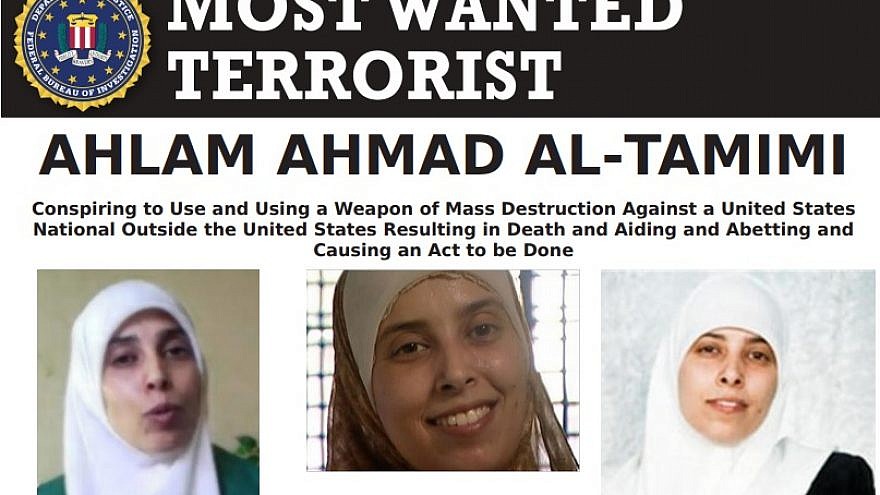The Trump administration has offered a $5 million reward for the capture of a Palestinian terrorist in Jordan, but apparently has not asked the Jordanian government to hand her over. Relatives of the terrorist’s victims are expressing disappointment and anger at what they call a half-hearted U.S. effort in this and similar cases.
The terrorist at the center of the controversy is Ahlam Ahmad al-Tamimi, one of the masterminds of the Aug. 9, 2001 bombing of the Sbarro pizzeria in Jerusalem. Fifteen people were killed in the blast, including two U.S. citizens: New Jersey schoolteacher Judith Greenbaum and 15-year-old Malki Roth.
Tamimi pleaded guilty in an Israeli court in 2003 and was sentenced to life imprisonment, but was released in a 2011 Israel-Hamas prisoner exchange. She then moved to Jordan, where she began hosting a television show on the Hamas-run Al Quds channel.

The Obama administration issued a formal criminal complaint against Tamimi in 2013, but kept it sealed. The Trump administration unsealed it last year.
The question of Jordanian extradition policy has added a wrinkle to the controversy. King Hussein signed a U.S.-Jordan extradition treaty in March 1995. However, a Jordanian court last year ruled that Tamimi could not be extradited because the treaty was never approved by the Jordanian parliament.
Asked by JNS whether or not the Trump administration considers the treaty to be in effect, a Justice Department spokesperson replied that “as a matter of policy, we generally do not comment on extradition, which would include confirming whether or not there have been communications between the U.S. Department of Justice and another government on an extradition matter.”
Many countries that do not have extradition treaties with America nevertheless voluntarily surrender criminal suspects to the United States. In 1995, Jordan permitted U.S. agents to enter the country to arrest Eyad Ismail, a suspect in the 1993 World Trade Center bombing.
The Justice Department had no comment when asked by JNS whether the United States has approached Jordan to surrender Tamimi outside formal extradition channels. The Jordanian Embassy in Washington also did not respond to multiple requests from JNS for answers.
“The United States gave Jordan $1.3 billion last year,” said Sarah Stern, president of the Endowment for Middle East Truth, which has led efforts on Capitol Hill on behalf of Americans harmed by Palestinian terrorists. “If the administration insisted, there’s no way the Jordanians could refuse a request to hand over Tamimi or at least allow FBI agents to go in and quietly arrest her.”
The State Department’s “Rewards for Justice” program offers multimillion dollar awards for information leading to the arrest of terrorists who have killed or injured Americans overseas. A $5 million award for information leading to Tamimi’s capture was recently posted on the program’s website.
A State Department spokesperson declined to comment in response to a question from JNS as to why it took 16 years to advertise a reward in connection with the Tamimi case.
This is only the third instance in which a reward has been offered in a case involving Palestinian terrorism in Israel. A total of 144 U.S. citizens have been killed and 197 wounded in Palestinian attacks since the 1960s.
Arnold Roth, the father of Sbarro bombing victim Malki Roth, told JNS that his repeated requests to discuss the rewards issue with State Department officials were “essentially ignored.” The $5 million reward was suddenly posted last week without explanation. “We have serious questions about how it is intended to operate,” said Roth. “Unfortunately, we have gotten no answers—and not for lack of asking.”
The Office for Victims of Overseas Terrorism, a Justice Department agency that is tasked with assisting terror victims and their families, declined to comment on the Tamimi controversy.
Roth also expressed dissatisfaction over the fact that the rewards website characterizes the Sbarro bombing as “violence in opposition to the Middle East peace negotiations.” The Israeli-Palestinian negotiations had halted more than seven months prior to that August 2001 attack.
“Perhaps we ought to let Tamimi speak for herself as to what motivated her to seek Israelis to murder,” Roth said, citing a television interview in which Tamimi said she did it “because this is a religious struggle.”
Stephen Flatow, a leader of the American Victims of Palestinian Terrorism advocacy group, told JNS: “For more than 20 years, the U.S. government has failed to take any serious action against Palestinian terrorists involved in killing Americans. We had hoped that the unsealing of the criminal complaint against Tamimi last year would represent a turning point. Sadly, it seems that little or nothing has changed.”


























